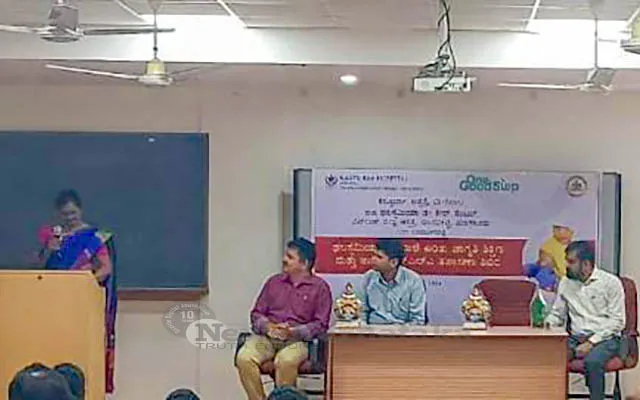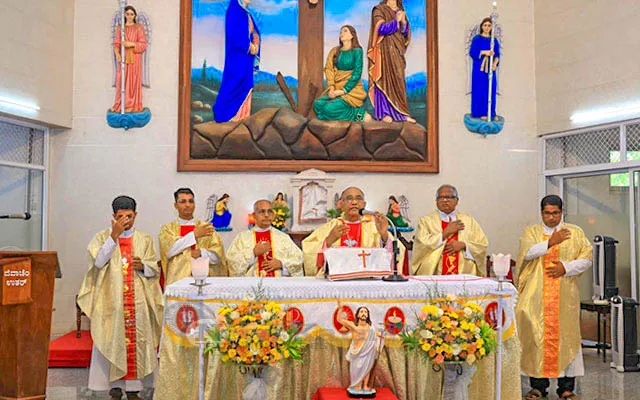
It is out in the open.
Times out of number, this was heard about, but mostly was dismissed as rumour.
Those honest educators and students hoped such news were not true.
The Hindu newspaper had a two column 20 cm report on 30 March 2021, about a lamentable state of a university professor who approached the local police and registered a complaint that he was cheated to the tune of seventeen lakhs by a conman. The more lamentable fact about the report is the cause for the cheating. The fact was that he had paid the conman the amount on the promise of making him a Vice Chancellor of one of the universities in Karnataka.
Woe betides! Whither university education!
I bow my head, with downcast eyes, with a sense of depression, with certain thoughts of condemnation, with an attitude of disapproval, and more than anything else, with a feeling of shame. However, the shame gives way to an anger that brims with despisal for oneself too, for being a teacher and a human resource developer for more than half a century and the first half of it in a college affiliated to the same university.
The sense of depression, the attitude of disapproval, thoughts of condemnation and feeling of shame were replaced by a sort of righteous indignation that could not be regulated unless expressed, at least verbally.
Who the devil are you to have an indignation and its expressions?
Memories associated with Mangalore University clustered into the mind. I remember meeting late Gundu Rao, the then Chief Minister, in the Circuit House at Kadri with an appeal for starting Mangalore University. Late G. K. Shenoy who was then the Principal of Canara College, Mangalore, who was also the President of the Principals’ Association of the then South Canara District and I being the Secretary of South Canara College Teachers’ Association, presented the memorandum. I remember organising and also attending several meetings of Mangalore University English Teachers’ Association as its Secretary. I remember different types of work done at the university as a member of the Board of Examiners and Board of Studies in English. I remember visiting several affiliated colleges as a member of Local Inspection Committees. I remember attending several Senate meetings as its elected member, elected from the Graduate Constituency. To top it all, I also remember slamming four court orders against the university in connection with administering a college, affiliated to university with a single degree, BHRD, as an experiment and research in effectiveness, the first of its kind in any university in the country and later closing the connections with the university.
This expression of engagement of bribing to become a Vice Chancellor is not anything surprising from one perspective. No section of a society can keep away from the general behaviors and associated values that are prevalent in a society. In a decadent society which flourishes on corruption as the mother of all evils, it is not surprising that the teaching community in the highest status also indulges in corruption. There has been plenty of news about professors collecting lakhs of rupees for awarding doctorate degrees to researchers. Equally distressing information has been made available about students buying certificates and marks cards from universities, not to mention professors awarding unfair internal assessment scores to students for unreasonable and despicable gains. Despite the justification of the educational scenario becoming a part of a decadent society, it is unpardonable that professors should indulge in these types of corrupt practices.
It is attributed to a former Governor of the state of Karnataka who started collecting ‘donations’ from aspiring candidates for the post of Vice Chancellor. I have had chances of associating with several Vice Chancellors for organising learning and development interventions for their professors and students. One of them told me that there were sponsors for Vice Chancellor’s posts who would pay the so called ‘donations’. How unfortunate it is that euphemistic terms are used to cover up stark corruption. If a lower division clerk in a government office collects some money, it is termed bribe, and if a professor pays to a governor or to a minister a considered amount for becoming a Vice Chancellor, it is a ‘donation’, even if the amount is paid at Bangalore or at Delhi, directly or through agents.
What awaits is more tragic. The professor who complained has accepted in writing that he had paid a bribe. However, the bosses that he has will not take any action against him. They will have plenty of reasons not to take any action. They need legal consultations and the like. Very often, they themselves are afraid because the complainant may be capable of spilling other beans which would be detrimental to those in power. Ultimately one only understands that it stinks and those involved are merrier in the stink.
The audacity of a professor to declare at the top of his voice that he had paid a bribe is a sort of statement of honesty even though it is like the declaration of righteousness by an offender or criminal. He did not hide at least one truth; reasons may be plenty, when he could play-act on the reasons for bribing and try to reduce the intensity of the crime while trying to salvage his lost money. A wrongdoer does not have the right to take a portion of the benefits of wrong-doing and ask for compensation for it when there is a failure to accomplish the crime. They say that the dons of the underworld have a special sense of honesty in keeping promises of doing offences and they stick to it. However, here, the professor seems to be naive in not signing a strong virtual contract of offence by taking care of himself. He seems to be a novice in such activities and might not have planned for redressal of a possible failure of indulging in a crime in association with a conman.
Who should start a movement to fight against corruption in the field of education, starting from someone becoming a Vice Chancellor by paying a bribe? In fact, thirty lakhs is a small amount compared to what has been spoken about in the case of others which amounts to several crores. The only one set of stakeholders in education who can fight against corruption in the field of education are the students. However, modern students are largely careerists and seem least concerned about social issues. In the last twenty-five years, my colleagues and I have interviewed more than 90,000 students from different institutions and universities across the country as a part of developing their answering skills in interviews and did not even get one per cent of students who were interested in fighting for a social cause. Truthfully, the statistics is alarming. If youth, especially youth in education, are not interested in fighting against social evils, who else should do?
The other chance is still less a possibility, which is with regard to educational institution fighting against corruption. A large number of private institutions are not established with an intention to serve people, they are mostly business concerns. Despite the fact that there are government regulations banning donations for admissions, they collect donations in the name of the Trust or Society which administers the institution and thus play hide and seek with their own conscience. I don’t deny that there are exceptions. I do recall with appreciation the stand taken by late Professor Reverend Father L.F. Rasquinha, my Principal in the early seventies of the last century, at St. Aloysius College, where I taught for a quarter of a century, taking a donation of Rs. 35.00 which was one division against the loss that the college suffered in the previous year for each student and that too taken directly to the college, not to the society. Today, we may not get a principal or a college in like manner. Therefore, one cannot expect the managements of colleges to fight against evil practices and corruption in education institutions because most of them are practitioners of it.
Kobad Ghandy is the author of ‘Fractured Freedom: A Prison Memoir’. The Hindu carried an article on him on Sunday, 29 March 2021. He was suspected to be a Naxalite and was arrested and was in jail for a decade until the Supreme Court freed him, stating that he is only an ideologue. He refers to the lack of possibility of a revolution which will reduce inequalities in our society. When the interviewer asked him whether he had lost his faith in the working class, he countered her with a question: Where is the working class? He commented that the working class has been neutralized because there are only contract and subcontract workers now, and they can never be organised.
Likewise, we cannot expect students or colleges to stand against the corrupt practices in the field of education. Either majority among both are parties to it, or are incapable to organise themselves against the monolithic, decadent structure of corruption, that stands as a bulwark, protecting the wrong doers and indulgent unsocial activists.
All the same, one’s eternal hope does not die a natural death. Deep within, there is an emergence of shades of possible success, in neutralizing the violence of corruption and uprooting it without giving any piece of it even underground.
About the author
Prof. Sunney Tharappan is the Director of College for Leadership and HRD, Mangaluru. He trains, writes and lives in Mangaluru.
Image courtesy Kritchanut from Pixabay
















